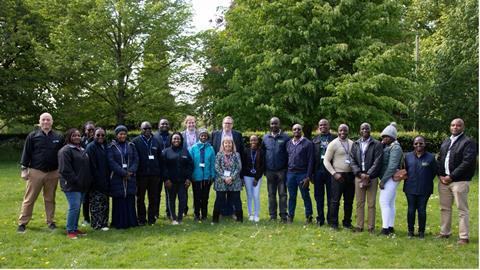Students from six different African countries will take part in the 10-week sustainable agriculture course at Harper Adams as vice chancellor notes benefit of bringing people together

A fresh cohort of 16 international students from six different African countries have arrived at Harper Adams University for an in-depth 10-week course on sustainable agriculture.
Each participant was chosen from a charity or organisation making a difference in Nigeria, Uganda, Tanzania, Ethiopia, Kenya or Zimbabwe, with the course sponsored by the Marshal Papworth Scholarship Fund (MPSF).
“All of the participants work for Marshal Papworth Fund partner organisations - Sliden Africa, Vegpro, Ripple Effect, Farm Africa, Hands Around the World and the Shangani Holistic Ranch,” said senior lecturer in Sub-Saharan and tropical agriculture, Ed Mashatise.
“The participants are typically agricultural extension officers and lead farmers who are change makers within their communities. We are delighted to welcome them to campus.”
Each year, the Marshal Papworth Fund provides scholarships for students from developing countries, including Masters scholarships to leading UK agricultural universities and colleges, as well as the tailored 10-week short course, developed with Harper Adams University.
This year’s short course students were welcomed to campus with a barbecue, attended by teaching staff, representatives from the Marshal Papworth Fund, the charity’s Patron - the Bishop of Brixworth the Right Reverend John Holbrook - and by Harper Adams’ vice-chancellor Professor Ken Sloan.
Professor Sloan said the placement is an opportunity to come together at a time of growing polarisation. “We are getting more and more messages about countries stepping away from other countries and continents stepping away from other continents, looking after themselves, and that is not good for us,” he said.
“That is not a political statement, that is a factual statement: we are a better set of people, and we are a better set of countries, if we hold on to our connections with others.
“Programmes like this are so important, because they bring different people from the continent of Africa together and then connect you with a whole raft of other people that you will meet, and then you will go back and have the opportunity to share what you have learned with so many people.”
Bishop John told the students: “We improve communities, and health, and food security around the world – you are part of what we are seeking to do, so it is great to welcome you.”
The Marshal Papworth Fund was formed in 2001 with funds bequeathed from Marshal Papworth, an East Anglian farmer. Managed by the East of England Agricultural Society, it has since funded a total of 260 students from developing countries.



